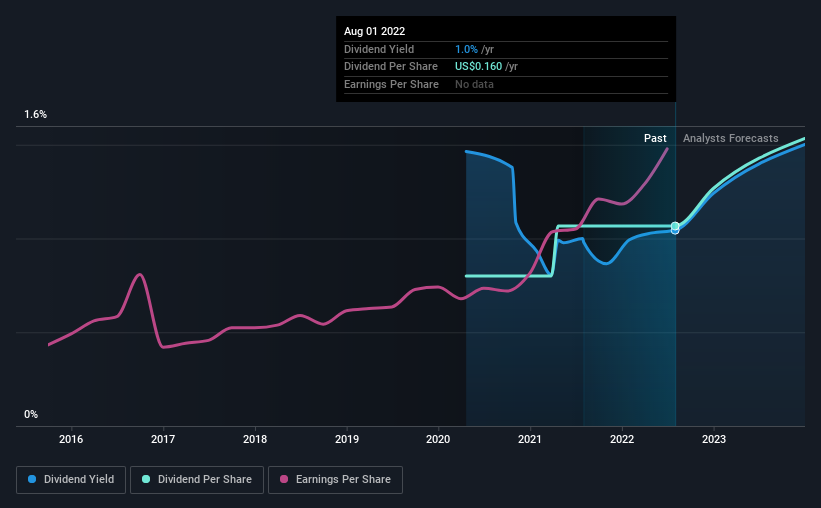The board of Provident Bancorp, Inc. (NASDAQ:PVBC) has announced that it will pay a dividend on the 26th of August, with investors receiving $0.04 per share. This means the annual payment will be 1.0% of the current stock price, which is lower than the industry average.
View our latest analysis for Provident Bancorp
Provident Bancorp's Payment Expected To Have Solid Earnings Coverage
While yield is important, another factor to consider about a company's dividend is whether the current payout levels are feasible.
Having paid out dividends for only 2 years, Provident Bancorp does not have much of a history being a dividend paying company. Based on its last earnings report however, the payout ratio is at a comfortable 13%, meaning that Provident Bancorp may be able to sustain this dividend for future years if it continues on this earnings trend.
The next year is set to see EPS grow by 20.7%. If the dividend continues along recent trends, we estimate the future payout ratio will be 12%, which is in the range that makes us comfortable with the sustainability of the dividend.

Provident Bancorp Doesn't Have A Long Payment History
The company has maintained a consistent dividend for a few years now, but we would like to see a longer track record before relying on it. The annual payment during the last 2 years was $0.12 in 2020, and the most recent fiscal year payment was $0.16. This works out to be a compound annual growth rate (CAGR) of approximately 15% a year over that time. It is always nice to see strong dividend growth, but with such a short payment history we wouldn't be inclined to rely on it until a longer track record can be developed.
The Dividend Looks Likely To Grow
Investors who have held shares in the company for the past few years will be happy with the dividend income they have received. It's encouraging to see that Provident Bancorp has been growing its earnings per share at 25% a year over the past five years. Earnings per share is growing at a solid clip, and the payout ratio is low which we think is an ideal combination in a dividend stock as the company can quite easily raise the dividend in the future.
We should note that Provident Bancorp has issued stock equal to 19% of shares outstanding. Regularly doing this can be detrimental - it's hard to grow dividends per share when new shares are regularly being created.
We Really Like Provident Bancorp's Dividend
Overall, we think that this is a great income investment, and we think that maintaining the dividend this year may have been a conservative choice. The company is easily earning enough to cover its dividend payments and it is great to see that these earnings are being translated into cash flow. All in all, this checks a lot of the boxes we look for when choosing an income stock.
Companies possessing a stable dividend policy will likely enjoy greater investor interest than those suffering from a more inconsistent approach. Meanwhile, despite the importance of dividend payments, they are not the only factors our readers should know when assessing a company. For instance, we've picked out 1 warning sign for Provident Bancorp that investors should take into consideration. Looking for more high-yielding dividend ideas? Try our collection of strong dividend payers.
New: Manage All Your Stock Portfolios in One Place
We've created the ultimate portfolio companion for stock investors, and it's free.
• Connect an unlimited number of Portfolios and see your total in one currency
• Be alerted to new Warning Signs or Risks via email or mobile
• Track the Fair Value of your stocks
Have feedback on this article? Concerned about the content? Get in touch with us directly. Alternatively, email editorial-team (at) simplywallst.com.
This article by Simply Wall St is general in nature. We provide commentary based on historical data and analyst forecasts only using an unbiased methodology and our articles are not intended to be financial advice. It does not constitute a recommendation to buy or sell any stock, and does not take account of your objectives, or your financial situation. We aim to bring you long-term focused analysis driven by fundamental data. Note that our analysis may not factor in the latest price-sensitive company announcements or qualitative material. Simply Wall St has no position in any stocks mentioned.
About NasdaqCM:PVBC
Provident Bancorp
Operates as the bank holding company for BankProv that provides various banking services to commercial and consumer clients in the United States.
Proven track record with adequate balance sheet.
Market Insights
Community Narratives



